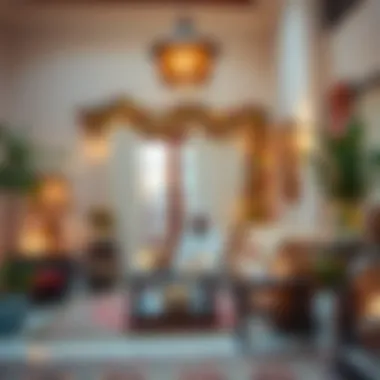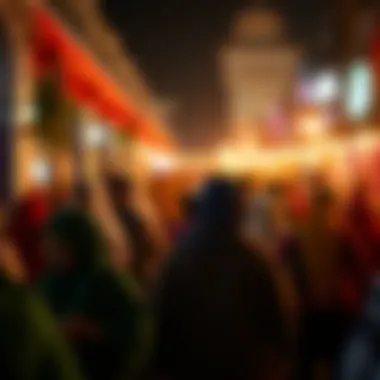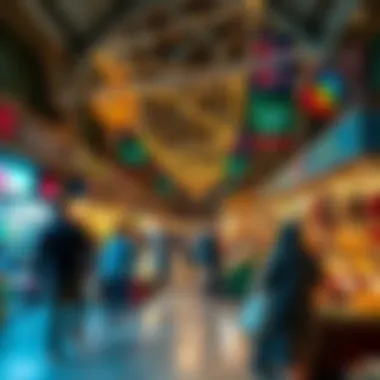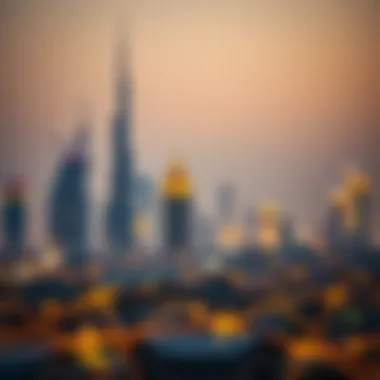The Impact of Eid Holidays on UAE's Culture and Economy


Intro
Eid holidays hold a unique place in the hearts of many living in the UAE. They don’t just mark the end of Ramadan or signify the festive spirit among the local populace; they act as an intersection of culture, economy, and community engagement. These periods of celebration foster deeper connections among friends, families, and neighbors, amplifying the UAE's collective identity.
Beyond the social aspects, the Eid holidays impact various sectors, particularly the real estate market. Understanding how these holidays influence economic behavior helps illuminate the broader context of UAE society and offers valuable insights for potential investors and residents alike.
From traveling trends to the surge in hospitality and retail, this article aims to dissect the myriad dimensions of the significance that Eid holds in this region. Placement in social settings, the changing dynamics of property investments, and community traditions are just some of the threads that weave the rich narrative of Eid in the UAE.
As we delve into these aspects, the exploration will provide a mix of both anecdotal experiences and market data, creating a well-rounded portrayal of these holidays’ importance in shaping the future of the UAE.
The Importance of Eid in UAE Culture
Eid holds a special place in the cultural tapestry of the UAE, serving as a reminder not only of religious obligations but also as a significant social occasion that energizes the community. The observance of Eid promotes a sense of belonging among citizens and expatriates alike, strengthening bonds that might otherwise remain unexamined amidst the daily grind.
Eid celebrations create an opportunity for people to come together, regardless of their cultural backgrounds. From posh social gatherings in luxurious hotels to modest family get-togethers at home, every observance is a reflection of the UAE’s diverse society. The festival encourages an exchange of traditions and practices, thus weaving a richer narrative about life in the Emirates.
Moreover, Eid is associated with charitable practices, underlining the compassionate essence of the occasion. Families often prepare extra meals to share with neighbors or donate food and clothing to those in need. Such acts amplify community solidarity and foster goodwill, aligning with the values of togetherness and generosity that are deeply embedded in the Emirati culture.
Historical Background of Eid Celebrations
The roots of Eid in the UAE trace back to the teachings of Prophet Muhammad, who established the significance of these celebrations through his actions and traditions. Eid al-Fitr, which marks the end of Ramadan, has its origins linked to the sighting of the moon, signalling the completion of the fasting month. Eid al-Adha, on the other hand, commemorates the willingness of Ibrahim to sacrifice his son, a story that resonates powerfully within Islamic tradition.
Historically, celebrations would vary, influenced by local customs and community values. In earlier times, Eid festivities were simpler; families would don their best attire, visit relatives, and share traditional sweets. Over the decades, the celebrations have escalated into grand public celebrations, complete with performances, fireworks, and large gatherings, yet they continue to hold onto their original spiritual essence, reflecting a delicate balance between modernity and tradition.
Eid as a Symbol of Unity and Community
Eid serves as a cornerstone for fostering unity within the diverse communities in the UAE. It is a time when people set aside their differences, extending greetings and good wishes to one another. The communal prayers held in parks and mosques act as a powerful demonstration of solidarity among the faithful.
Families often invite friends and even newcomers to partake in the festivities, reinforcing relationships that transcend mere acquaintanceship. Offerings during Eid can range from sweet pastries such as maamoul to savory dishes reflecting a mixture of culinary backgrounds. The shared meals, laughter, and conversations during these gatherings symbolize the strength of community ties and help to reduce any barriers of social status or background.
In essence, Eid encapsulates the spirit of togetherness by encouraging and sustaining relationships, reminding everyone that while individualism is celebrated, it is the collective experience that binds a community.
"Eid is not just about festivity; it’s about belonging. It’s where we find that common thread woven through our lives in the UAE."
Understanding the significance of Eid provides a clear lens to observe how cultural celebrations can influence community identity, tighten bonds, and offer a glimpse into the socio-economic fabric of the nation.
Types of Eid Holidays Observed in the UAE
Eid holidays in the UAE hold a special place in the hearts of the local population and expatriates alike. These celebrations are deeply intertwined with cultural practices and have significant implications for interactions among communities. Understanding both Eid al-Fitr and Eid al-Adha offers insight into the broader themes of unity, charity, and festivity that characterize society in the UAE. Each Eid serves a unique purpose and echoes different traditions that resonate throughout the fabric of the nation.
Eid al-Fitr: Celebrating the End of Ramadan
Eid al-Fitr marks the culmination of Ramadan, the holy month of fasting observed by Muslims. This occasion is not just a celebration of breaking the fast but also of gratitude and spiritual reflection. When the crescent moon is sighted, signaling the end of Ramadan, families come together to engage in joyous celebrations, showcasing the importance of kinship, and shared joy.
Traditionally, the day begins with a special prayer service held in mosques or large open areas, where congregations gather to perform the Eid prayer. This is often followed by a communal meal, known as the Eid breakfast, where delicious dishes are served, fostering a sense of togetherness.
Moreover, one of the core aspects of this celebration is the practice of Zakat al-Fitr, which involves giving to the less fortunate before the festive meal. This embodies the spirit of giving and emphasizes the importance of social responsibility.
Some popular traditions during this time include:
- Visiting family and friends: This is a time when relationships are renewed, and bonds are strengthened through shared meals and laughter.
- Dressing in new clothes: It’s customary for many to wear newly purchased or traditional clothing, symbolizing a fresh start.
- Exchanging gifts: Children are especially eager for this, often receiving Eidiyah, or cash gifts, as a token of celebration.
Eid al-Fitr is not only a spiritual occasion but also acts as a catalyst for social cohesion. In bustling cities like Dubai and Abu Dhabi, the holiday season sees an uptick in community events and gatherings, turning the entire festive period into a unique experience.
Eid al-Adha: Commemorating Sacrifice
Eid al-Adha, known as the "Festival of Sacrifice," pays tribute to the willingness of Ibrahim (Abraham) to sacrifice his son in obedience to God's command. This holiday occurs approximately 70 days after Eid al-Fitr and often coincides with the Hajj pilgrimage, which is one of the five pillars of Islam.
On Eid al-Adha, families engage in the practice of Qurbani, which involves the ritual sacrifice of an animal, typically a sheep, goat, or cow. This act symbolizes the willingness to give up something valuable for a greater cause. The meat is then distributed among family, friends, and those in need, reinforcing the value of sharing and community support.
The day’s observance begins with communal prayers similar to Eid al-Fitr and is often followed by:


- Gatherings for the sacrifice: Families come together to perform the ritual, which strengthens family ties and local traditions.
- Charitable acts: Beyond distributing the meat, many engage in other charitable activities, embodying the essence of Eid by helping less fortunate members of society.
- Festive meals: Following the sacrifice, meals are prepared that often feature the meat, contributing to a rich culinary tradition that varies by region.
Both Eid al-Fitr and Eid al-Adha serve as pillars of social interactions in the UAE. They bring families and communities together, enhancing the sense of belonging and generosity. As such, these holidays have become critical in shaping the emotional and cultural landscapes of the UAE.
Public and Private Sector Observances of Eid Holidays
Eid holidays in the UAE hold tremendous significance, not just for personal celebrations and cultural festivities, but also for public and private sectors that operate within the economic framework of the nation. Observance of these holidays affects various aspects ranging from employee morale to overall business productivity. Understanding how both sectors prepare and engage during these periods is essential for grasping the larger implications of Eid on the UAE's communal and economic landscape.
Government Announcements and Holiday Listings
In the UAE, government announcements regarding Eid holidays play a pivotal role. The official declaration regarding the start and end of each Eid is made by the moon-sighting committee, which is responsible for determining the sighting of the moon to mark the Islamic calendar months. This uncertainty about the exact start date adds an element of excitement, prompting many to keep their ears to the ground for news on public announcements.
Once confirmed, the federal government publishes an official holiday schedule. This often entails extensive public communications, including announcements through media outlets and governmental platforms. The clarity of these announcements assists businesses and employees alike in planning their time off, thereby minimizing confusion. No one wants to be caught off guard with conflicting holiday dates.
Benefits of Announcing Holidays in Advance:
- Clarity for Businesses: Establishing a clear holiday schedule helps businesses manage operations efficiently during peak times.
- Planning for Employees: Employees appreciate knowing their time off, allowing them to make travel or family arrangements well in advance.
- Cultural Significance: Highlighting Eid holidays fosters a sense of community and collective celebration among citizens and residents alike.
Impact on Work Schedules and Hours
The impact of Eid holidays stretches beyond personal festivities; it reshapes the work life of many in the UAE. Both public and private sectors tend to modify work schedules significantly during these times. It’s not just about days off; it's about creating an atmosphere of joy and unity.
In most cases, federal institutions observe several days off, often exceeding the private sector's offerings. This discrepancy can lead to a surge in productivity as employees return from extended breaks, bringing fresh energy to their roles. However, for other organizations, especially in hospitality and hospitality sectors, the holiday usually means adapting rather than pausing operations. These companies often adjust their hours to accommodate increased customer demand and special activities planned for Eid.
Moreover, the work-life balance shifts during the occasion. Employees looking to combine holiday festivities with their work responsibilities often seek flexible arrangements. Many companies recognize this need and offer alternatives, like flexible hours or a more relaxed dress code, to create a more amicable atmosphere.
In summary, the public and private sectors' observances of Eid holidays in the UAE are crucial, impacting both individual employee experiences and broader economic activities. They reflect the UAE's cultural values and foster a sense of community, helping each sector cater effectively to their workforce and clientele.
"Eid not only honors our faith; it brings together the past, present, and future within the vibrant fabric of UAE society."
From government announcements to adjustments in work schedules, every aspect of Eid observance underscores the significance of these holidays in strengthening community bonds and enhancing productivity across various sectors.
Relevant Links
Social Customs and Traditions During Eid
Eid holidays in the UAE are not merely a time for rest and relaxation. They encapsulate a rich tapestry of social customs and traditions that reinforce community bonds and cultural heritage. The festive atmosphere brings people together, from families to friends, creating a spirit of unity that permeates through all levels of society. Observing these traditions not only highlights the importance of communal values but also emphasizes the unique identity of Emirati culture.
Culinary Traditions and Festive Foods
When Eid rolls around, the culinary scene becomes a vivid showcase of tradition and hospitality. Food plays a central role in how families celebrate, with each dish steeped in meaning and history. For instance, dishes like marguga (a spiced dish made of meat and flatbread) and knafeh (a delectable dessert made with thin noodle-like pastry soaked in syrup) take center stage on dinner tables across the UAE.
Typically, families dedicate time to prepare these festive foods, often involving multiple family members in the cooking process. This shared effort not only builds anticipation but also reaffirms family ties. Meals during Eid are more than just nourishment; they represent the wealth of generosity and hospitality. The phrase “Eat and be merry!” often echoes through gatherings, encouraging guests to indulge and savor the culinary delights.
Furthermore, the practice of serving traditional meals to neighbors and those in need exemplifies the spirit of communal support. In the UAE, sharing food during Eid reflects a deeper value of compassion and generosity, encouraging people to think beyond their needs. This is especially poignant in urban centers like Dubai and Abu Dhabi, where multicultural influences blend into the festive offerings.
Gift-Giving and Charity Practices
Alongside feasting, gift-giving emerges as another cherished tradition during Eid. It’s common for family members and friends to exchange gifts, typically wrapped with care and often accompanied by personal notes or cards. Gifts may range from simple items, like sweets and decorative ornaments, to more substantial offerings like money or clothing. The act of giving serves as a tangible expression of love and appreciation among loved ones.
In addition to personal gifts, charitable giving holds a sacred place during Eid. The concept of Zakat al-Fitr, a form of almsgiving, is particularly significant. Before the Eid prayer, it’s common for Muslims to donate to those less fortunate, ensuring that everyone can partake in the celebrations. This practice reinforces the Islamic values of charity and social responsibility. It's a call to action for the affluent to lend a hand and support the less fortunate, enhancing the communal atmosphere.
The dual nature of gift-giving and charity intertwines seamlessly within the festive spirit of Eid, showcasing a balance between personal joy and social duty. As such, these customs not only brighten the festivities but also foster an environment of mutual respect and collective happiness within the UAE community.
"Eid reminds us that true joy comes through sharing, whether it’s a meal, a gift, or a helping hand."
In summary, the vibrant social customs and traditions during Eid holidays in the UAE profoundly impact community cohesion. The culinary richness and the ethos of giving that emerge during this time resonate deeply, reinforcing the moral fabric of Emirati society. As expatriates and investors alike navigate this landscape, understanding these customs offers invaluable insight into the cultural significance of Eid and enhances their appreciation for the local way of life.
Eid Holidays and Their Effects on Real Estate in Dubai


Eid holidays in the UAE hold a paramount significance that extends beyond cultural celebrations. They intricately influence various aspects of life, particularly the real estate market in Dubai. This bustling metropolis is not just a hub of culture and technology; it's also an ever-evolving landscape for property investment. Observing the fluctuations in the property market during the Eid seasons provides keen insights into consumer behavior, investment patterns, and market dynamics driven by the festive spirit.
Increased Demand for Rental Properties
Eid celebrations tend to bolster demand for rental properties significantly. As families gather for these holidays, many expatriates and locals decide to host relatives and friends, prompting them to look for short-term rental options. This surge in demand is evident across various property types, from luxurious villas to more budget-friendly apartments. Moreover, tourists flock to Dubai during this festive season, eager to experience the local culture, cuisine, and celebrations, further boosting the rental market.
- Property Types in Demand:
- Key Effects on Rental Prices:
- Vacation homes
- Apartments in tourist hotspots
- Villas with spacious accommodations
- Increased rental rates due to high demand
- Rise in inquiries for short-term leases and holiday homes
This spike in rental activity has led to an uptick in platform listings, making it an opportune moment for both property owners and investors. Those who are savvy about market trends often prepare their listings well ahead of the Eid season to capitalize on the enthusiastic influx of renters.
Investor Behavior During Holiday Seasons
Investor sentiment can take on a different hue during the Eid holidays. With the joyous atmosphere and community spirit that permeates through the celebrations, many investors view this period as a fruitful time for property acquisition. They are often motivated by the idea of capitalizing on later rental opportunities as families seek homes during this peak travel season.
- Buyer Motivations:
- Positive market conditions during the festive season
- Anticipated appreciation in property values
Also, regional and international investors see Eid as an ideal time to dive into the Dubai real estate market. The holiday brings several properties to the forefront—owners might be more willing to negotiate deals in a festive mood. As families look to purchase their own homes, the market gets a little heated.
"Eid holidays not only signify a time of celebration but also a beacon for investors eyeing the vibrant Dubai real estate prospect."
The anticipation built around Eid can lead to asset price stabilization and even an upward pressure on property values, proving how celebrations can also solidify investment opportunities. Understanding these dynamics offers prospective buyers and agents an edge when navigating the market during these significant holidays.
In sum, Eid holidays in Dubai usher in a wave of activity in the real estate sector. From the surge in rental demand to the strategic buying patterns observed, these celebrations present both challenges and opportunities that players in the market should not overlook.
Travel Trends During Eid Holidays
Travel trends during Eid holidays are a significant consideration, especially in a cosmopolitan place like the UAE. This period sees a surge in both domestic and international journeys, primarily driven by cultural traditions, family ties, and the desire for leisure. Understanding these trends gives us insights into the broader implications for the economy, real estate, and social dynamics within the UAE.
Domestic Travel Patterns Within the UAE
During Eid, families in the UAE often embark on local trips, exploring the beautiful landscapes and attractions their home country offers. These travel patterns are influenced by several factors:
- Cultural Significance: Many families prefer to celebrate Eid in the comfort of their homes or close to family. This trend promotes local tourism, with popular destinations such as Al Ain and Fujairah seeing increased visits from residents.
- Festive Activities: Various events and activities pop up in cities like Dubai and Abu Dhabi during Eid. From lavish fireworks displays to cultural festivals, the holiday atmosphere encourages domestic travel. Residents are tempted to visit malls, parks and beach resorts to partake in these festivities.
- Affordable Options: With the high costs typically associated with international travel, many choose to explore local areas that offer similar joys at a fraction of the price. For instance, a family might opt for a staycation in a luxurious hotel or a desert resort instead of heading abroad.
"Eid brings families together. Traveling within the UAE allows families to deepen bonds and embrace the unique local culture."
Moreover, public transport services often ramp up during Eid, making domestic travel easier and more accessible for families. This has a ripple effect on the hospitality sector, with hotels and restaurants preparing for the influx of visitors looking for festivities and relaxation.
International Travel Preferences
Eid holidays also trigger a significant spike in international travel from the UAE. Many expatriates and locals seize this time to visit family in their home countries or take vacations. Some notable preferences include:
- Popular Destinations: Countries like India, Pakistan, and Egypt see a rise in travelers from the UAE during Eid as many wish to connect with their heritage. Meanwhile, some residents opt for relaxing beach holidays in places like the Maldives or Thailand, seeking sun and unwind.
- Traveling for Family Reunions: For countless expatriates, Eid is an occasion to reunite with family. This often leads to packed flights and long booking queues, especially as many wait until the last minute to finalize their plans.
- Maximizing Holiday Time: The extended break during Eid is an attractive option for travelers looking to make the most of their time off. Many people combine the holiday with annual leave, resulting in longer vacations abroad.
As flights get booked up and costs rise with demand, travel agencies often report a bustling business climate in the days leading up to Eid. They frequently provide tailored packages to cater to specific cultural needs, including celebrations that align with Eid traditions.
In summary, the travel trends during Eid reflect the unyielding connection between tradition and modernity. While domestic patterns foster local tourism, international preferences highlight the multifaceted nature of UAE residents’ backgrounds. Both dynamics contribute to the enriching tapestry of travel during this festive time.
The Economic Impact of Eid Celebrations
Eid celebrations in the UAE are not just moments of joy and festivity; they bring substantial economic vigor to the region. The holiday season catalyzes significant activity across various sectors. Families and individuals partake in a myriad of traditions, which in turn drives consumer spending and economic growth. From retail to hospitality, the influence of these celebrations permeates every layer of the economy, laying a foundation for robust development that is both immediate and sustainable.
Retail and Hospitality Sector Growth
The retail and hospitality sectors experience a noticeable uptick during Eid holidays. This period sees a surge in consumer spending, as individuals invest in gifts, new clothing, and delicious food for family gatherings. In bustling malls like The Dubai Mall and the Mall of the Emirates, stores often flaunt Eid promotions, enticing shoppers with discounts and special offers.


Retailers typically experience a sales boost of % to % compared to regular periods.
- Major brands also roll out limited-edition products tailored to the festive spirit, anticipating demand from both locals and tourists alike. This proactive approach to marketing complements the rise in foot traffic in shopping districts, as families seek to maximize their holiday experience.
In the hospitality sector, hotels and restaurants often offer exclusive Eid packages that cater to the celebratory mood. Families dine out to relish traditional dishes, such as biryani and kebabs, often in lavish buffets. The increased demand ensures that establishments are bustling with activity, sparking growth in staffing needs, which contributes significantly to the local economy.
“Eid is more than a holiday; it's a launchpad for economic opportunity.”
Job Creation and Seasonal Employment
The hustle and bustle that characterizes Eid celebrations does not merely benefit established businesses; it also leads to significant job creation. Retailers expand their workforce to meet the short-term demand, whether through seasonal hires or overtime for existing employees. As a result, the holiday creates a wealth of opportunities for part-time positions across sectors, which often includes:
- Cashiers and sales associates in retail stores.
- Hospitality staff, including servers and kitchen personnel.
- Event planners and coordinators for Eid festivities.
This temporary employment surge can be particularly advantageous for students or individuals seeking to bolster their income. According to recent studies, up to 50,000 temporary jobs are created annually during the Eid period in the UAE alone. Workers gain valuable experience while contributing to the vibrant pulse of the season.
The economic implications of Eid celebrations extend beyond immediate sales and temporary roles. The connection between festive periods and job growth emphasizes the profound effect of cultural practices on global commerce. The festive atmosphere cultivates not just spending habits, but a renewed passion for community, enabling both businesses and workers to flourish.
As we consider the economic implications of Eid, one must reflect on its broader significance—how it transforms local economies and fosters a spirit of unity and prosperity among those who partake in its offerings.
Future Trends Related to Eid Holidays in the UAE
Understanding the emerging trends related to Eid holidays in the UAE is pivotal, especially for those involved in sectors that hinge on social and economic shifts. The interplay between tradition and modernity shapes how Eid is celebrated, and recognizing these trends can help investors, homeowners, expatriates, agents, and analysts make informed decisions. With the UAE continuously adopting a forward-thinking approach while respecting its rich cultural heritage, the ways in which Eid is observed have evolved, paving the way for future developments.
Evolution of Traditions and Modern Celebrations
One notable trend is the blending of traditional practices with contemporary celebrations. For many Emiratis, Eid has always been anchored in longstanding customs such as prayer, family gatherings, and charity. However, younger generations are adding their flair to these traditions. Today, there's a marked shift with digitalization influencing the holiday's fabric.
- Social Media Influence: Social platforms play a crucial role in how people share their experiences and connect with each other during Eid. The rise of posts documenting festive activities, from culinary delights to fashion, has reshaped how friends and family interact.
- Modern Events: Cities like Dubai and Abu Dhabi now host large-scale public celebrations, featuring concerts, fireworks, and exhibitions, creating an atmosphere that resonates with both locals and tourists alike.
For example, an increasing number of malls and community centers hold Eid fairs, blending shopping with cultural celebrations, enhancing community engagement.
This intertwining of original customs with new-age celebrations showcases the UAE’s ability to honor its traditions while embracing the modern world. Yet, it also brings challenges. There’s a risk that commercialization might overshadow the holiday's core values, which can impact societal bonding.
Potential Changes in Real Estate Dynamics
The economic implications of Eid celebrations extend beyond retail and hospitality; they significantly affect the real estate landscape as well. As Eid approaches, landlords and property managers often experience shifts in rental demand.
For instance,
- Short-Term Rentals: With many expatriates opting for staycations or families planning to welcome guests from abroad, there is often a spike in demand for short-term housing solutions. This creates opportunities for investors as vacation rentals see increased profitability during these holiday seasons.
- Family Gatherings: Larger properties may find a surge in interest as families wish to accommodate extended relatives visiting during Eid. This trend can lead to fluctuating prices and increased competition for rental units, especially in popular areas.
"By understanding the seasonal fluctuations associated with Eid, investors can strategically position themselves to capitalize on emerging opportunities."
Moreover, the demand for properties outfitted with festive amenities, such as larger dining areas for gatherings, indicates a potential pivot in real estate development concepts in response to holiday trends. Investors and analysts must keep a close eye on these patterns to anticipate future demands and align their strategies accordingly.
In summary, the future trends regarding Eid holidays in the UAE point towards a fascinating blend of tradition and modern developments, significantly influencing the economy, social contexts, and real estate dynamics. By staying attuned to these trends, stakeholders across various sectors can harness the power of Eid to their advantage.
For further reading on cultural trends and impact on society, visit Wikipedia and explore articles related to contemporary festive practices.
Culmination: Understanding Eid's Role in UAE Society
Eid holidays serve not only as a time for communal celebration but also deepen the understanding of cultural identity within the UAE. As we reflect on the myriad aspects of these holidays, it becomes clear that they embody more than just ceremonial observances. They are intertwined with the broader socio-economic structures and community values of the country.
Reflecting on Cultural Values
The essence of Eid is deeply rooted in spirituality and cultural heritage. During these holidays, we see a cultivation of traditional values which are passed down through generations. This festive period offers a chance for individuals to reconnect with their religious beliefs, family, and community. For instance, the practice of sharing meals illustrates not just culinary traditions, but also a commitment to fostering connections. Families gather to enjoy traditional dishes such as biriyani or mutton stew, often prepared with love and shared among friends and neighbors.
Moreover, gift-giving, known as Eidi, signifies sharing blessings and goodwill. This simple act strengthens social bonds and reinforces a sense of belonging within the community. It's not merely the act of giving that counts but the intentions behind it that evoke feelings of appreciation and unity. In today's fast-paced world, such reflections on cultural values are crucial, as they remind us of the importance of community and collective identity.
Eid's Lasting Influence on Community and Economy
The impact of Eid extends beyond the confines of tradition and spills over into economic realms. The holiday encourages local markets and promotes small businesses that thrive off the festive spirit. During Eid, retailers experience a sharp increase in sales, from clothing to luxury goods. This surge contributes to the overall growth of the retail sector, enhancing the economic landscape.
Furthermore, Eid holidays create temporary employment opportunities, providing seasonal jobs for many who otherwise may struggle to find work. This not only helps individuals but also supports families during economically challenging times.
"Eid is a phenomenon where tradition meets opportunity, creating a vibrant marketplace for everyone involved."
In essence, the significance of Eid holidays in the UAE goes beyond personal celebration; it constructs a framework that supports communal unity, nurtures cultural values, and positively affects economic dynamics. As UAE society evolves, so too does the understanding and appreciation of Eid, ensuring its relevance for future generations.





